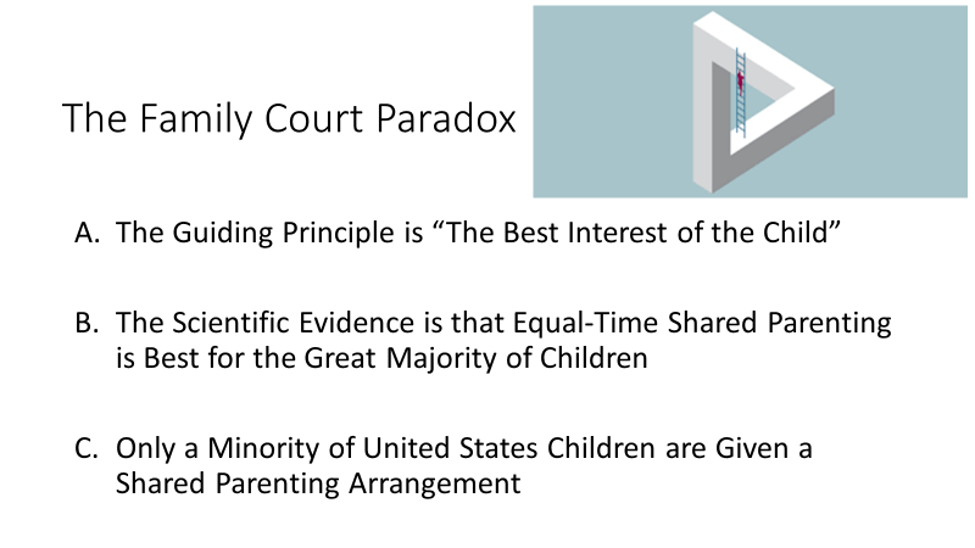
February 4, 2020
A video-taped symposium on ‘Reducing Parental Conflict and Harm to Children’ was held last week at the Connecticut Legislature.
The first invited speaker was Professor Martin Kulldorff at Harvard Medical School, who talked about the ‘Scientific Evidence on Shared Parenting’ (video @32:00). Based on a review paper by Dr. Linda Nielsen, he presented the scientific evidence that shared parenting is in the best interest of the great majority of children, in terms of mental health, physical health, behavior and inter-personal relationships. From tables containing effect estimates from each outcome in each study, there were overwhelming evidence that shared parenting is better, and for some outcomes, the differences were surprisingly large. He concluded that there is a family court paradox between (i) the best interest of the child principle, (ii) the scientific evidence that shared parenting is in the best interest of the vast majority of children, and (iii) the fact that only a minority of children live in a shared custody arrangement. Dr. Kulldorff ended his presentation stating that if shared parenting was a medical drug, it would easily be approved by the FDA for its mental health benefits and the pharmaceutical company would make billons from it.
The second speaker was Professor Emily Douglas from Worcester Polytechnical Institute, one of the nations’ leading experts on child abuse and other forms of domestic violence (@54:20). She spoke about ‘Stepping Out of the Shadows: Men’s Experiences with Partner Violence Victimization and Recent Efforts to Meet their Needs’. She explained that somewhere between 20-50% of adult domestic abuse victims are men, but that their support system is less developed than for women. While some men have positive experience receiving help from medical professionals, domestic abuse agencies, hotlines and the police, other men described how their cry for help where summarily dismissed and disbelieved. Dr. Douglas also discussed legal aggression as a form of domestic abuse as well as the negative effect on children when witnessing domestic abuse.
University of Connecticut professor emeritus John Clapp was the third speaker, basing his talk on the Hollywood portrayal of divorce in the recent ‘Marriage Story’ movie (@1:40:20). He cited the movie review by New York Times, which stated that custody battles require parents ‘to participate in a legal process that is artificial and estranging by nature, calling on them to make cartoon villains of each other’. He then asked if that was an accurate description of divorce in Connecticut. Dr. Clapp contrasted Connecticut with Sweden, where divorce is less contentious as the parents are told that absent abuse, it is ‘highly unlikely’ that the outcome in court will be anything other than equal-time shared parenting.
The last speaker was an experienced divorce mediator, Colleen O’Neill, who spoke on ‘Mediation and Alternative Dispute Resolution in Divorce’ (@1:54:00). After first describing her own personal experiences, she outlined the short- and long-term benefits of mediation, for both the parents and children. She also spoke about the need for professionals to have mental health training to make family assessments during divorce proceedings.
The symposium ended with comments and questions from the audience. Responding to one question concerning the financial impact of shared parenting on the state (@2:34:00), all panel members agreed that it would save money for Connecticut tax payers; in court, school and health related expenditures.
With help from NPO, this symposium was organized by the Shared Parenting Council of Connecticut (SPC). NPO and SPC are planning additional activities in the state, and if you are interested in joining the important efforts for shared parenting and against domestic abuse in Connecticut, please contact the NPO national office. We will then put you in contact with the right people.

